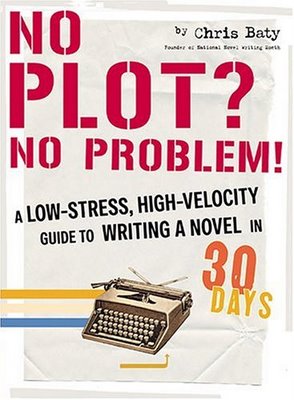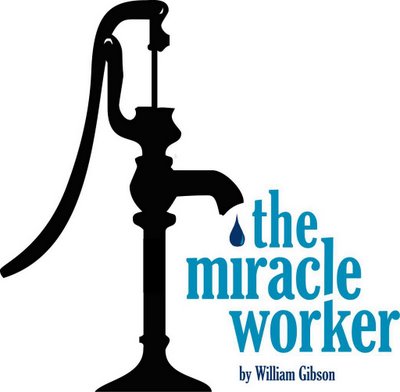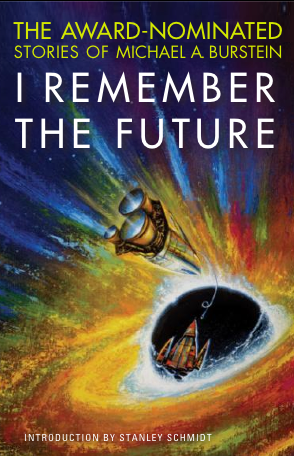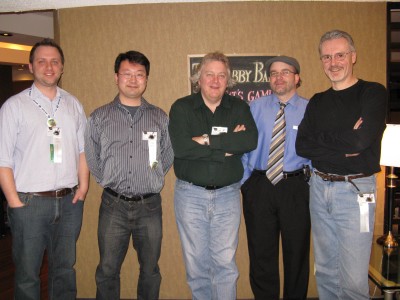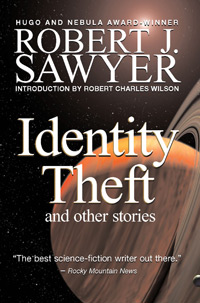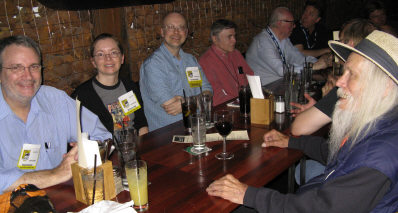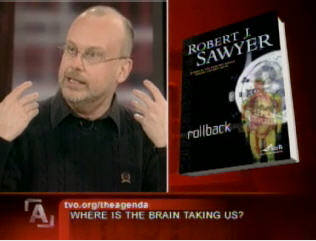
The following first appeared as the lead article in Spring 2008 edition of the The Writers' Union of Canada
Newsletter (Volume 36, Number 1). Although the references to Canadian media outlets may be unfamiliar to people from outside Canada, the general principles are still applicable.
(The screen capture above is from an appearance Robert J. Sawyer made on TVOntario's
The Agenda.)
Using Traditional Media to Promote Your Book
by Robert J. SawyerMost authors aim their promotional efforts directly at readers. That's misguided, in my view; you simply can't reach enough of them on your own to make a difference — and you risk becoming a pest in the circles you move in. No, your publicity efforts should be aimed at the media.
A while ago, I attended a talk by Cynthia Good, who used to be publisher of Penguin Canada. Someone in the audience asked her what was the first thing she looked for in evaluating a book. Her answer was immediate: "A way to get the author on TV."
Note that your goal shouldn't principally be book-related media. Although all of us mourned the loss of
Imprint on TVOntario, an appearance on almost any other TV program would sell more books. Same thing with newspapers: sure, it's nice to be covered in the review section, but you should really be aiming for off-the-book-page news.
To accomplish this — to get on TV shows that aren't about books, to get into other sections of the newspaper, to get into major magazines — you need to have
something to say.
Even publishers don't know this, although they should. The press release my publisher did for my last novel was headlined, "A new novel by Canada's leading Science Fiction author." Ho hum. I turned around and wrote
my own release with the headline, "Human Lifespan Will Be Radically Extended Soon, says Award-Winning Author." I sent it on my own to CBC Radio One's flagship
Sounds Like Canada, and got a
24-minute interview there.
You think Dan Brown sold 35 million hardcover copies of
The Da Vinci Code because of its compelling narrative or unforgettable protagonist? No, the buzz about that novel was because of its theme. I didn't see the press release, but I'd bet money it said something like, "Catholic Church Systematically Suppresses Women" or "Christ May Have Fathered Children," rather than, "Thriller Set at Louvre" or "Mysteries Abound in Chase Novel."
The best way to have a hook, of course, is to build it in to the book from the outset. When John Grisham or
Michael Crichton set out to create a novel, they decide what issue they're going to tackle — what hook the book is going to have — before writing the first sentence. Whether it's the controversy around capital punishment (Grisham's
The Chamber) or the perceived problems with biotechnology (Crichton's
Next), they give the media something to sink their teeth into.
Okay, but
your book isn't like that. You've penned a delicate, sensitive tale of ... whatever. You aren't necessarily out of luck. Scour your manuscript and find something people might be interested in — even if it's
not the central material in the book — and focus on that in your promotional efforts. (For my novel
Calculating God, I did a number of interviews about the closing of the McLaughlin Planetarium in Toronto, a fact that's only a minor point in the book.)
But what if you've combed your book, searching for a hook and just can't find one that's internal to the text? Fine: look for an external one — a real-world event you can tie your book to. You've written a book about a young boy? This year is the hundredth anniversary of the founding of the Boy Scouts. A book about civil rights? It's the Thurgood Marshall centenary, too. Remember, "author" and "authority" have the same root; by having written a book — even if it's a novel — you are an authority on your topic.
It's seventeen months away as I write this but I can already tell you where I'll be on July 20, 2009; I'll be on CBC Radio. Why? Because that's the 40th anniversary of the first moon landing, and I can easily spin that into a reason for people to interview a science-fiction writer. You have to plan your campaign — and it's worth talking to your publisher about scheduling your next release to coincide with a good tie-in, if you know one's coming up.
Okay, now that you've got your
press release ready, who do you send it to?
First, every person who has ever interviewed you in the past (you
do keep records, don't you — and you keep them up to date, right?).
Second, to everyone who might care about your theme (for
Rollback, I did a number of interviews with radio shows and publications aimed at the elderly; for
Calculating God — my novel about
evolution vs. creationism — getting a copy to Tom Harpur, who was the religion columnist for
The Toronto Star, resulted in an entire column devoted to my book).
Third, to all the big players:
Sounds Like Canada,
Canada AM, and
Breakfast Television for any sort of book, plus the appropriate CBC shows for your particular work. Science or nature?
Quirks and Quarks. Something that's actually quirky or hip?
Definitely Not the Opera. Current affairs? TVOntario's
The Agenda. Hit them all, and hit them often: promotion is cumulative. I've often had producers call me and say, "We've got a thick file on you; I guess it's time we did something."
Of course, all of this comes back to the unstated assumption behind what Cynthia Good said. Once you
do land the TV interview, you'd better do it well. Learn to be
good on camera and in front of a mike. Get some media training, take a public-speaking course, join Toastmasters, go to a media coach.
For TV, radio, and print, have a series of anecdotes ready to go — what inspired you, the most surprising thing you learned writing your book, and so on.
And don't waste your time answering the pointless questions about what you're working on now, or what's next; no one will remember what you said a year or more down the road, when that book will be out. Just steer the conversation back to the current book ("I'm working on another book about Canadian politics, but right now I'm most interested in Stephen Harper ...").
But don't try to shoehorn mentions of your book's title into the conversation; just relax and look like you're having a good time ... and trust the public to want to get to know you better, through the pages of your latest book.
For more of my thoughts on promoting books, see
here (scroll down).
Robert J. Sawyer has sold twenty novels and two short-story collections. He lives in Mississauga; his website is sfwriter.com. 
The Robert J. Sawyer Web Site
